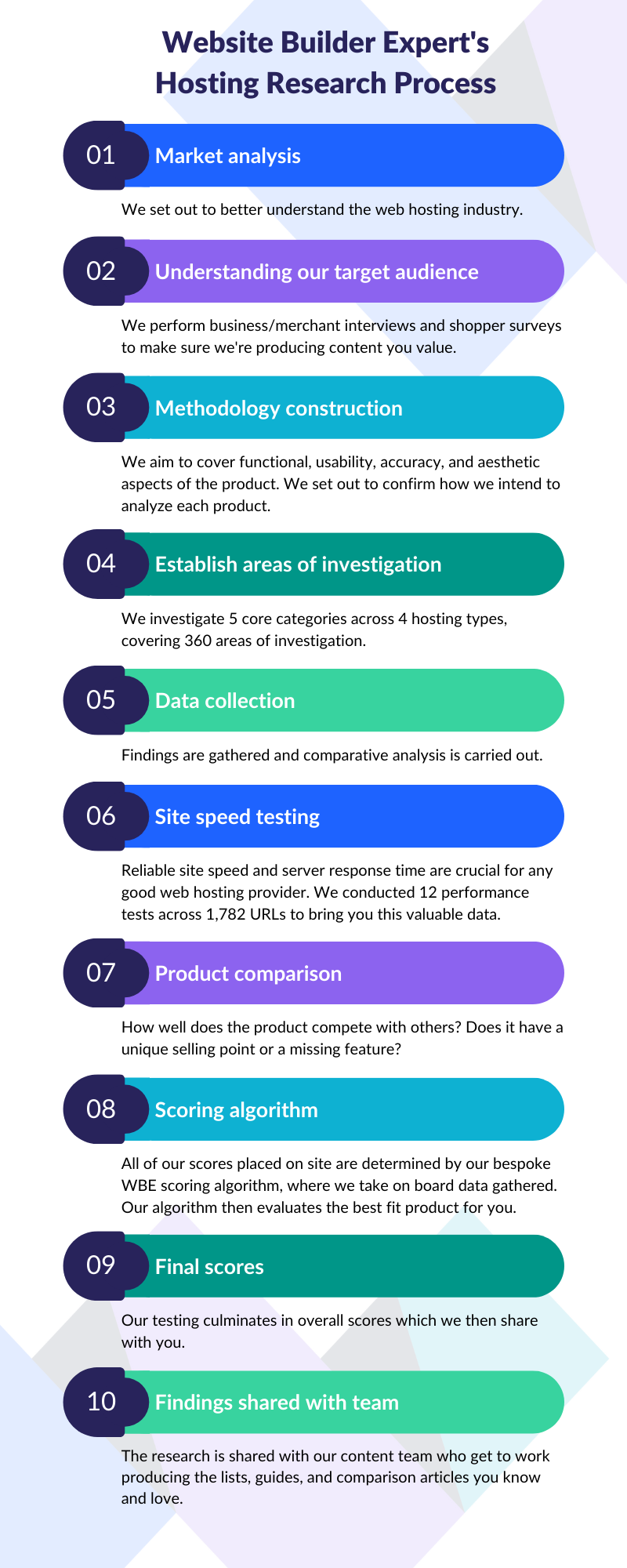How We Conduct Our Hosting Research
If you click to purchase a product or service based on our independent recommendations and impartial reviews, we may receive a commission. Learn more
The web hosting provider you choose will determine how many visitors your site can accommodate, how much content you can safely store, and how user-friendly the site will generally be. In short, choosing the best host for your website’s needs is important.
We know, it sounds like a big decision – and it is! You shouldn’t take it lightly, which is why we’ve conducted extensive research into the hosting industry and each hosting provider so we can make data-led recommendations for you.
We value trustworthy research, and we guarantee that we’ve never sold rankings, positions, or positive reviews. So, how do we make money? All of the money that we make comes through referral commissions and affiliate links across our pages. If a reader signs up to a platform or hosting provider through one of our links, we’ll get paid by the company behind the product!
If you’re not satisfied, we won’t make a cent, and that’s why we try our hardest to bring you the best recommendations for your needs. We won’t waste your time with products or services that we can’t vouch for.
Our Research Process
Using our 10+ years of digital experience as a foundation, we put in almost 2,000 hours to research and analyze the top web hosting providers.

Our in-house research team focused on the four main hosting types that matter most to our readers – shared hosting, WordPress hosting, VPS hosting, and dedicated hosting – and, in total, 13 hosting providers were studied.
From that, we identified the five most important performance areas to consider when choosing a hosting provider:
- Price – Is the provider affordable? Is it good value for money?
- Performance – How much storage is offered? Is the server dependable?
- Features – What add-ons and essentials are included?
- Help and support – How easy is it to get assistance when you need it?
- Market analysis – How well does the provider perform against its competitors?
In total, we examined 360 areas of investigation within each performance area and scored hosting providers against the five key categories. Then, we calculated an overall rating by averaging the five scores.
We know, it’s a lot to take in! Let’s take a closer look at our hosting research process:
Price
It’s easy enough to rank hosting providers from cheapest to most expensive and call it a day, but web hosting is often a long-term purchase, so we think it’s well worth doing the math to find out how much each provider will charge over time.
But, how do we determine a provider’s price rating? Our algorithm focuses on the cost of hosting a site on a monthly basis for 12 months – this is why you’ll see our hosting reviews and guides mentioning the 12-month plans, instead of a cheaper, more long-term subscription.
We believe that this pricing view represents an average buyer in a particular market, but also allows us to fairly compare hosting providers, since all of them offer 12-month plans. We use this metric to cover all types of hosting, including shared and dedicated hosting.
When pulling together our final calculation for our pricing scores, we also make sure to take into account the renewal fees, number of plans offered, and a provider’s money-back guarantee.
Performance
A good hosting provider is nothing without reliable uptime, site speed, and power behind it. When it comes to our performance research, we analyze a provider’s storage space, bandwidth, cores, threads, RAM, server response time, and site speed.
In fact, we assessed over 1,700 individual websites to examine the response time, overall performance, speed, and time to interact – all of which are incredibly important for efficient hosting.
We also have to give a special nod to uptime since it’s so important to any website. Simply put, uptime is the amount of time that the server hosting your site is up and running – if it’s down, visitors won’t be able to access your site.
Most web hosting providers offer uptime between 99.90% and 99.99%. This might seem like only a slight difference, but 99.90% uptime amounts to around nine hours of downtime per year, which adds up! 99.99% uptime, on the other hand, means just under an hour of downtime per year.
When the relevant information is gathered, uptime rankings are very easy to determine: it’s a matter of which hosting providers have the highest percentage, and which have the lowest. However, we understand that accuracy matters when it comes to uptime, so we draw real-time uptime averages from the provider, third-party sources, and publicly available data.
Features
A feature can be defined as any additional functionality that makes your website run better. This includes everything from free domain names and automated backups to bandwidth capacity and server locations.
When comparing different hosting providers and hosting types, the number of features included on each plan will vary. To determine a score for hosting features, we take a look at:
- Migration – Can you easily transfer your website to a new hosting provider?
- IP addresses – Does your plan come with free IP addresses?
- Root access – Can you access your server without restrictions?
- Backups – Does your provider offer free automated backups? How regularly do they backup your site’s data?
- Security – How does the hosting provider keep your website safe from harm?
- Domains – Is a free domain included in your hosting plan?
- Control panel – Does the provider use cPanel or its own custom control panel?
- Green hosting – How eco-friendly is your web host?
- Server location – How many server locations are there? Where are they located?
Next, we translate these individual components into an overall score for each hosting provider. Of course, some features will matter more than others for different hosting types and we’ll redistribute scoring appropriately – for example, root access is important for dedicated hosting but not shared hosting plans.
Help and Support
Good hosting is vital to a website’s success, so it’s important that a hosting provider offers responsive and high-quality customer support to fix – and prevent – any problems. After all, web hosting isn’t always the easiest thing to wrap your head around, and it’s likely you’ll need a helping hand every once in a while.
The “help and support” performance area evaluates all support channels, but we paid particular attention to three key service areas: live chat support, email support, and the knowledge base of how-to guides and advice. The users we surveyed highlighted these three areas as the most important to them.
Market Analysis
Last, but not least, we analyze each hosting provider’s position in the market. What does this mean? Well, we review the competition – can hosting provider A compete with the amount of hosting types, plans, and features on offer by hosting provider B? How does its pricing compare?
Next, we look at how popular the hosting provider is. What do real customers think of the product? How many people are searching for Bluehost or HostGator, for example?
When all of this has been researched and examined, we can then produce an overall market analysis score to each hosting provider.
Hosting Type Differences
There are many types of websites out there, and there are plenty of hosting types to accommodate them all. As a result, we adapt our research and adjust our scores depending on which categories are the most important for a certain type of website, such as a blog or online store.
We don’t just use the same scores for every option – this means we can give you custom and unique recommendations.
For example, someone looking for VPS hosting would be more concerned with disk space than someone after a shared hosting plan. People looking for an eco-friendly provider would be interested in hearing about a host’s carbon offsetting efforts, while someone with a WordPress site will care about added benefits of a WordPress hosting plan.
At Website Builder Guide, we support this unique “type of hosting” scoring so we can accurately highlight what each provider is good and bad at. We always consider the fact that different plans across providers and hosting types support varying levels of storage space and RAM, for example – and are priced differently.
Meet the Researchers
 Natasha Willett – As Website Builder Guide’s Lead Researcher, Natasha has clocked over 9,600 hours of product research and testing to bring you fair recommendations based on data. If we look at hosting specifically, the research team analyzed and examined providers for 48 weeks in total – equal to about 2,000 hours of research. Natasha has expert credentials in research and is fully qualified with a BSc, Ma, and MMRS. She’s worked as a mixed method researcher for the last nine years (with five years at Website Builder Guide), and she’s a member of the Market Research Society.
Natasha Willett – As Website Builder Guide’s Lead Researcher, Natasha has clocked over 9,600 hours of product research and testing to bring you fair recommendations based on data. If we look at hosting specifically, the research team analyzed and examined providers for 48 weeks in total – equal to about 2,000 hours of research. Natasha has expert credentials in research and is fully qualified with a BSc, Ma, and MMRS. She’s worked as a mixed method researcher for the last nine years (with five years at Website Builder Guide), and she’s a member of the Market Research Society.
Website Builder Guide aims to provide you with honest data. That’s why we conduct our own research and obtain direct, personal insight. Analyses and graphics in this article are based on authentic sources, cross-validated by our in-house experts. We take great care to ensure the information we publish is reliable and accurate. However, WBE takes no responsibility for any inaccuracy in information supplied to us by users, research participants, or other entities.
Please note the insight contained within this article is for general information purposes only. We’re happy to answer any questions you may have about this article and its supporting research. For further information, please contact Website Builder Guide directly via email at info@
websitebuildingguide.com.

Leave a comment